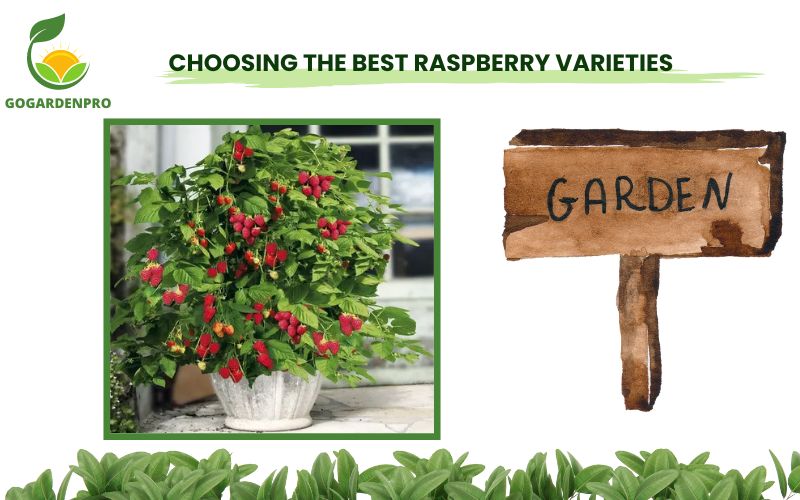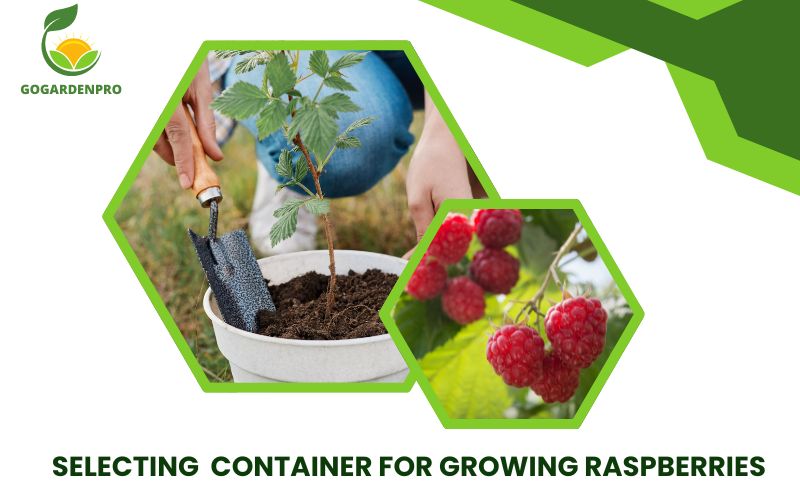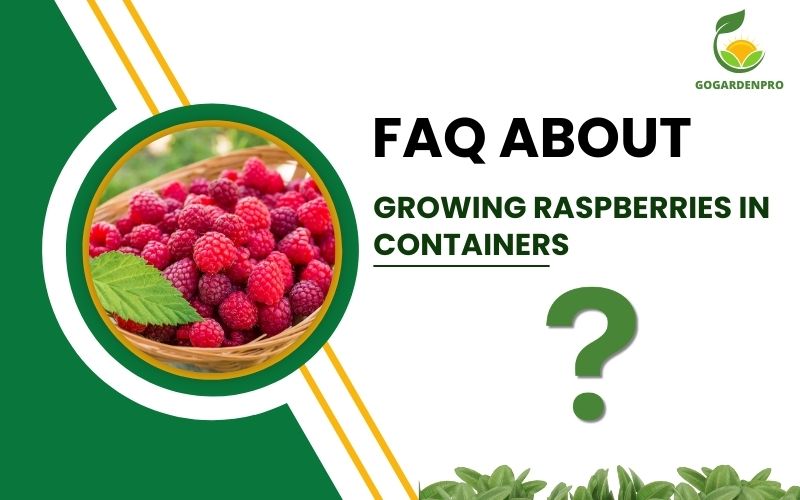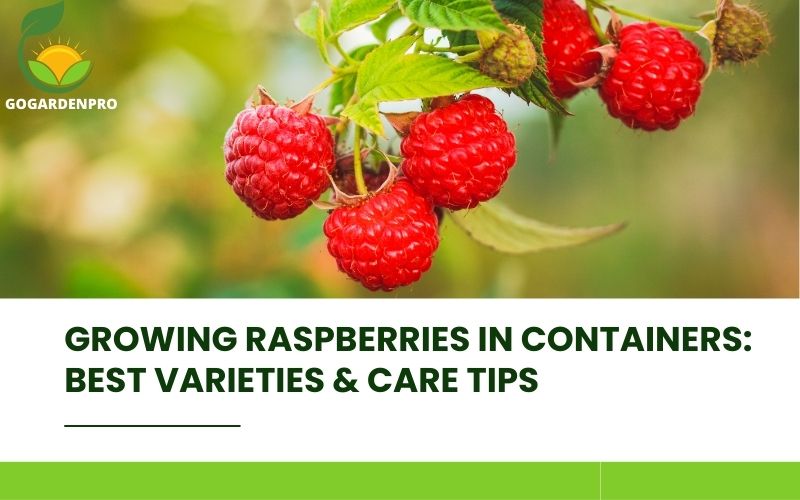Growing raspberries in containers is a fantastic way to enjoy fresh fruit even in small spaces. At GoGardenPro, we’re here to guide you through every step, from selecting the right container size to perfecting your pruning techniques.
Let’s dive into how you can successfully grow raspberries in containers and reap a bountiful harvest.
Contents
- 1 Quick Care Guide
- 2 Instructions for growing raspberries in containers
- 2.1 Choosing the Best Raspberry Varieties for Container Gardening
- 2.2 Preparing the Ideal Potting Soil for Raspberries in Containers
- 2.3 Selecting the Right Container for Growing Raspberries
- 2.4 Step-by-Step Guide to Planting Raspberries in Containers
- 2.5 Watering and Fertilizing Raspberries in Containers
- 2.6 Supporting Raspberry Canes in Containers
- 2.7 Pruning Raspberry Plants for Health and Productivity
- 2.8 Common Pests and Diseases in Container-Grown Raspberries
- 2.9 Overwintering Raspberry Plants in Containers
- 2.10 Troubleshooting Common Issues in Container Raspberry Gardening
- 3 FAQ growing raspberries in containers
- 3.1 How big of a container do raspberries need?
- 3.2 Do raspberries grow better in pots or ground?
- 3.3 Do raspberries need full sun?
- 3.4 How many years does it take for a raspberry bush to produce fruit?
- 3.5 What not to plant with raspberries?
- 3.6 What happens if you don’t prune raspberries?
- 3.7 Where is the best place to plant raspberries?
- 3.8 Do raspberries need a lot of water?
- 3.9 Are coffee grounds good for raspberry plants?
- 3.10 How often should I water raspberry plants in pots?
- 4 Conclusion
Quick Care Guide
| FACT | DETAIL |
|---|---|
| Common Name of Plant(s) | Raspberry |
| Scientific Name | Rubus idaeus |
| Containers | 24 inches in diameter, 18 inches deep; plastic or wood containers with good drainage |
| Seeds | N/A (typically grown from canes or bare-root plants) |
| Soil | Slightly acidic, pH 6.0-6.2; enriched with compost, aged manure, and peat moss |
| Fertilizer | Balanced organic NPK fertilizer; high-potash fertilizer during fruiting |
| Sunlight | Full sun, at least 6 hours per day |
| Water | 2-3 times per week, keep soil moist but not waterlogged |
| Support | Stakes, trellises, or tomato cages for tall canes |
| Pests/Diseases | Aphids, cane borers, cane blight, Botrytis fruit rot; treat with neem oil |
| Equipment / Tools | Pruning shears, watering can, pH meter, garden gloves |
| Materials | Mulch (straw or wood chips), drainage materials (gravel, broken pottery) |
Instructions for growing raspberries in containers
Choosing the Best Raspberry Varieties for Container Gardening

Selecting the right raspberry varieties is crucial for successful container raspberry gardening.
Varieties like Raspberry Shortcake and Heritage Raspberry are perfect for container-grown raspberries due to their compact size and high yield.
Whether you prefer summer-bearing or everbearing varieties, you’ll find that these raspberries for containers offer robust growth and delicious fruit.
Preparing the Ideal Potting Soil for Raspberries in Containers
For thriving container raspberries, the soil must be slightly acidic, with a pH of 6.0-6.2. Adding compost, aged manure, and peat moss will enhance soil quality and ensure good drainage.
Remember, raspberries dislike “wet legs,” so ensure your container has proper drainage holes to prevent waterlogging.
Selecting the Right Container for Growing Raspberries

The choice of containers for raspberries plays a significant role in their growth. Opt for a container size of at least 24 inches in diameter to give the roots plenty of space.
Materials like plastic or wood are ideal, provided they have adequate drainage to avoid root rot. These raspberry containers will support healthy plant growth and abundant fruiting.
Step-by-Step Guide to Planting Raspberries in Containers
When planting raspberries in containers, it’s essential to space the canes properly and plant them at the right depth.
Mulching the soil surface with straw or wood chips helps retain moisture and prevent weeds. This method ensures that your raspberry container plants have the best start.
Watering and Fertilizing Raspberries in Containers
Consistent watering is key to healthy raspberry container growing. Keep the soil moist but not waterlogged, watering about 2-3 times per week.
Use a balanced organic NPK fertilizer and supplement with a high-potash fertilizer to promote fruiting.
Supporting Raspberry Canes in Containers
Tall raspberry canes often need support to prevent bending under the weight of the fruit. Using stakes, trellises, or tomato cages will help maintain their structure. Proper support is crucial for ensuring a healthy and productive raspberry container garden.
Pruning Raspberry Plants for Health and Productivity
Pruning is essential for maintaining the health and productivity of your container raspberries.
Focus on removing damaged or diseased canes in the spring, controlling size mid-season, and performing a thorough clean-up after the harvest. This care routine helps prevent issues like Botrytis fruit rot and encourages new growth.
Common Pests and Diseases in Container-Grown Raspberries
Container-grown raspberries are susceptible to pests like aphids and cane borers. Using natural treatments such as neem oil can effectively control these problems.
Regular pruning and good air circulation can also help prevent fungal diseases like cane blight and Botrytis fruit rot.
Overwintering Raspberry Plants in Containers
To protect your raspberry container plants during winter, consider moving the pots to an unheated garage or shed. Reduce watering during this time to allow the plants to go dormant, ensuring they survive the cold months and are ready to thrive in spring.
Troubleshooting Common Issues in Container Raspberry Gardening
If you encounter problems like poor fruiting or yellowing leaves in your container raspberries, it might be time to reassess your care routine.
Adjust watering, check for pests, and ensure your raspberry container gets enough sunlight. By addressing these issues promptly, you’ll ensure a healthy and fruitful plant.
FAQ growing raspberries in containers

How big of a container do raspberries need?
Raspberries need a container that is at least 16-24 inches in diameter and about 18 inches deep to allow adequate space for root growth.
Do raspberries grow better in pots or ground?
Raspberries generally grow better in the ground, but they can also thrive in pots with proper care.
Do raspberries need full sun?
Yes, raspberries need full sun, ideally at least six hours per day.
How many years does it take for a raspberry bush to produce fruit?
Raspberry bushes typically produce fruit in their second year.
What not to plant with raspberries?
Avoid planting raspberries near potatoes, tomatoes, or peppers.
What happens if you don’t prune raspberries?
Without pruning, raspberries can become overcrowded, leading to poor air circulation and reduced fruit production.
Where is the best place to plant raspberries?
Plant raspberries in full sun with well-draining soil, in a location protected from strong winds.
Do raspberries need a lot of water?
Raspberries need consistent moisture, especially during fruiting.
Are coffee grounds good for raspberry plants?
Yes, coffee grounds can benefit raspberries by adding organic matter and maintaining slightly acidic soil.
How often should I water raspberry plants in pots?
Water potted raspberries 2-3 times per week, more often in hot or dry conditions.
Conclusion
Thank you for joining gogardenpro.com on this journey into raspberry container gardening. We hope this guide inspires you to start growing your own delicious raspberries. Feel free to share your experiences and connect with fellow gardeners by leaving a comment below!

